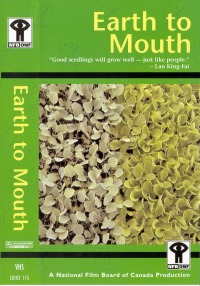| ________________
CM . . .
. Volume XI Number 3 . . . . October 1, 2004
Lau King-Fai moved to Canada from southern China's Hunan province in 1994, at the age of sixty-five. Like many immigrants, she came to join a family sponsor, her son. Unlike most immigrants, she did not settle in a major urban centre. Rather, she landed at Wing Fong Farm near Newcastle, Ontario, east of Oshawa, where her son grows mainly Asian vegetables for regional Chinese markets and restaurants. Director Yung Chang captures life on the farm over a one-year-period, from tilling, to harvest, to winter rest. He focuses on Lau King-Fai, who tells her life story in Cantonese (with English sub-titles), and upon six migrant, Spanish-speaking Mexican labourers who arrive in March with just the shirts on their backs and who endure long, physically exhausting hours of work in order to finance the education of their children back home and ultimately to provide opportunities that will enable them to enjoy a better life. Life on the farm is much quieter than the bustle of China that Lau King-Fai left behind. Nevertheless, she finds her new life in Canada quite satisfying - whether praying at the family shrine, watering sprouts in the greenhouse, packing vegetables with a young woman, or reading a Chinese newspaper during the dormant days of winter. Similarly, the Mexican workers adjust to their seasonal life in Canada. With their women back home raising the children, the men take their washing to the local laundromat, shop at the grocery story, and prepare their own meals, even when exhaustion makes them want to collapse in bed after a shower. For Lau King-Fai and the workers, family remains just one phone call away. The documentary moves at a gentle pace. Light-filled shots of sun drenched fields, rich harvests, and stolen moments of the farm owner fishing from a canoe combine with the peaceful musical accompaniment of a solo flute or guitar or the interplay of the same with the violoncello or synthesizer. The meditative tone of the film threatens to romanticize farm life, yet the workers' hard work and self-sacrifice serve as reminders to the viewer that the journey of food from the earth to the table is not really a simple one. Appropriately, the film ends with shots of a busy kitchen in a Chinese restaurant where Lau King-Fai is socializing with her family and friends over a typical Chinese meal. Earth to Mouth has potential uses in many fields as evidenced by the subject categories assigned to it on the National Film Board of Canada website: Agriculture-Ontario Recommended. Val Ken Lem, a catalogue librarian at Ryerson University in Toronto, ON, is interested in the cultural activities of Canadians of Asian heritage.
To comment
on this title or this review, send mail to cm@umanitoba.ca.
Copyright © the Manitoba Library Association. Reproduction for personal
use is permitted only if this copyright notice is maintained. Any
other reproduction is prohibited without permission.
NEXT REVIEW |
TABLE OF CONTENTS FOR THIS ISSUE
- October 1, 2004.
AUTHORS |
TITLES |
MEDIA REVIEWS |
PROFILES |
BACK ISSUES |
SEARCH |
CMARCHIVE |
HOME |
